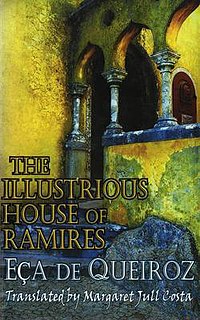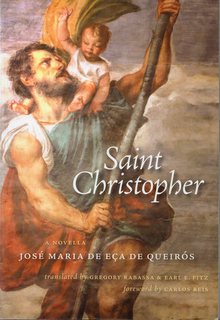
The European Court of Auditors(ECA) is the fifth institution of the European Union (EU). It was established in 1975 in Luxembourg.

José Maria de Eça de Queiroz is generally considered to have been the greatest Portuguese writer in the realist style. Zola considered him to be far greater than Flaubert. The London Observer critics ranked him alongside Dickens, Balzac and Tolstoy. During his lifetime, the spelling was "Eça de Queiroz" and this is the form that appears on many editions of his works; the modern standard Portuguese spelling is "Eça de Queirós".
Aurélio Buarque de Holanda Ferreira was a Brazilian lexicographer, philologist, translator, and writer, best known for editing the Novo Dicionário da Língua Portuguesa, a major dictionary of the Portuguese language.
Margaret Elisabeth Jull Costa OBE is a British translator of Portuguese- and Spanish-language fiction and poetry, including the works of Eça de Queiroz, Fernando Pessoa, Javier Marías, Bernardo Atxaga, José Régio and Nobel Prize winner José Saramago.

José Duarte Ramalho Ortigão was a Portuguese writer of the late 19th century and early 20th century.
Vice-Admiral Vicente Manuel de Moura Coutinho de Almeida d'Eça was a Portuguese colonial administrator who served as the last Governor of Portuguese Cape Verde in 1974, and then its High Commissioner from December 1974 until its independence from Portugal in July 1975. Almeida turned 100 in July 2018 and died three months later.
António de Eça de Queiroz or de Queirós was a Portuguese monarchist politician and agitator and an official in the Estado Novo of António de Oliveira Salazar. He was married to Maria Cristina Guimarães Rino, without issue.
Ferdinand of Portugal, later of Eça or Eza, was the son of Portuguese Infant João, Duke of Valencia de Campos. João, was a son of king Peter I of Portugal with powerful and literary famous for several centuries in several European languages, Galician lady Inés de Castro, "the Queen who ruled after her death".

Luís de Almeida Portugal Soares de Alarcão d'Eça e Melo Silva Mascarenhas, 2nd Marquess of Lavradio(27 June 1729 in Lisbon - 2 May 1790) was the 11th Viceroy of the Portuguese colony of Brazil, the second one that ruled the colony after the seat of government moved to Rio de Janeiro. He was the son of a Marquis of the same title, D. António de Almeida Soares e Portugal and his wife, D. Francisca das Chagas Mascarenhas. During the 1762 Spanish invasion of Portugal, he commanded the 1st Cascais Infantry Regiment.
Diogo de Melo Coutinho was the second and eleventh Captain-major of Portuguese Ceylon. Coutinho was first appointed in 1552 under John III of Portugal, he was Captain-major until 1552. His second term lasted from 1570-1572. He was succeeded by Duarte de Eça and António de Noronha respectively.
The Siege of the Portuguese fort Santa Cruz de Gale at Galle in 1640, took place during the Dutch–Portuguese and Sinhalese–Portuguese Wars. The Galle fort commanded 282 villages, which contained most fertile cinnamon lands in southern Sri Lanka It was also an important strategic coastal defense of Portuguese Ceylon. The Dutch, who were in an alliance with the Kingdom of Kandy, landed an expeditionary force under Commodore Willem Jacobszoon Coster of Akersloot, at the Bay of Galle, on 8 March 1640. After bombarding the fort for four consecutive days, Dutch troops stormed the fort and secured a victory on 13 March 1640. The Portuguese garrison, led by Captain Lourenço Ferreira de Brito, mounted a stiff resistance and unexpectedly high casualty rates among Dutch troops gave rise to the proverb “Gold in Malacca, lead in Galle”. With this victory the Dutch gained access to a large port which they later used as a convenient naval base to attack Goa and other South Indian Portuguese defenses. They also gained access to the Sri Lankan cinnamon trade and gained a permanent foothold on the island.

The School of Communications and Arts at the University of São Paulo is an institution of higher education and research in the field of Arts and Communication located in São Paulo, Brazil. It was established in 1966 as School of Cultural Communication.

The Illustrious House of Ramires was the final novel written by the Portuguese writer José Maria de Eça de Queirós (1845-1900) and was published posthumously. A new English translation, by Margaret Jull Costa, was published in 2017, together with an Afterword by the translator. It has been described as a “satiric look at the existential state of Portuguese society on the brink of the modern age”.

As Farpas was a monthly publication started by the authors and journalists Ramalho Ortigão and Eça de Queirós. It first appeared in 1871, when the authors were, respectively, 35 and 26, and was published in Portugal until the end of 1882. Subtitled "The Country and Portuguese Society", the monthly issues presented a caricature of the society of the time and are considered an important contribution to Portuguese literature and the launching of critical journalism in the country.

The Mystery of the Sintra Road is the first novel published by José Maria de Eça de Queirós, initially as a newspaper serialization in 1870 and subsequently as a book. It was co-written with Ramalho Ortigão. It is considered to be the first Portuguese detective story. An English translation by Margaret Jull Costa and Nick Phillips was published in 2013, and includes an Afterword by Phillips and the Preface to the Third Portuguese edition by the authors.

The Tragedy of the Street of Flowers is a novel by José Maria de Eça de Queirós, also known as Eça de Queiroz. It was only first published in Portuguese in 1980. The first English version, translated by Margaret Jull Costa, was published by Dedalus Books in 2000, to coincide with the centenary of the author’s death.

Alves & Co. is a novella by José Maria de Eça de Queirós, also known as Eça de Queiroz. It was only first published in Portuguese in 1925, 25 years after the author's death. The first English version, Alves and Co., was translated by Robert M. Fedorchek and published by the University Press of America in 1988. This was followed by a translation titled The Yellow Sofa, by John Vetch and published by Carcanet Press in 1993. The latest translation, by Margaret Jull Costa, was published by Dedalus Books in 2012, together with six short stories by the same author. Alves & Co. is a comic novella on the theme of infidelity and its consequences.

The Mandarin is a novella on the sin of avarice by José Maria de Eça de Queirós, also known as Eça de Queiroz. It was first published in Portuguese in 1880. The first English version, translated by Richard Franko Goldman, was published by The Bodley Head in 1965. A translation by Margaret Jull Costa, was published by Dedalus Books in 1993. A revised version was published by Dedalus in 2009, together with three short stories.

The City and the Mountains is a satirical novel comparing the emptiness of upper class life in Paris with the pleasures found in rural Portugal. It was written in 1895 by José Maria de Eça de Queirós, also known as Eça de Queiroz, when he was living in Paris. The novel was published posthumously in Portuguese in 1901 with a final edit and an ending contributed by his friend, Ramalho Ortigão. The first English version, translated by Roy Campbell, was published by the Ohio University Press in 1967. A new translation by Margaret Jull Costa, was published by Dedalus Books in 2008, and republished in 2018.

Saint Christopher is a novella by José Maria de Eça de Queirós, also known as Eça de Queiroz, that draws on the legend of Saint Christopher. Written in the 1890s, it was first published posthumously in Portuguese in 1912. The first English version, translated by Gregory Rabassa and Earl E. Fritz, was published by Tagus Press in 2015.














